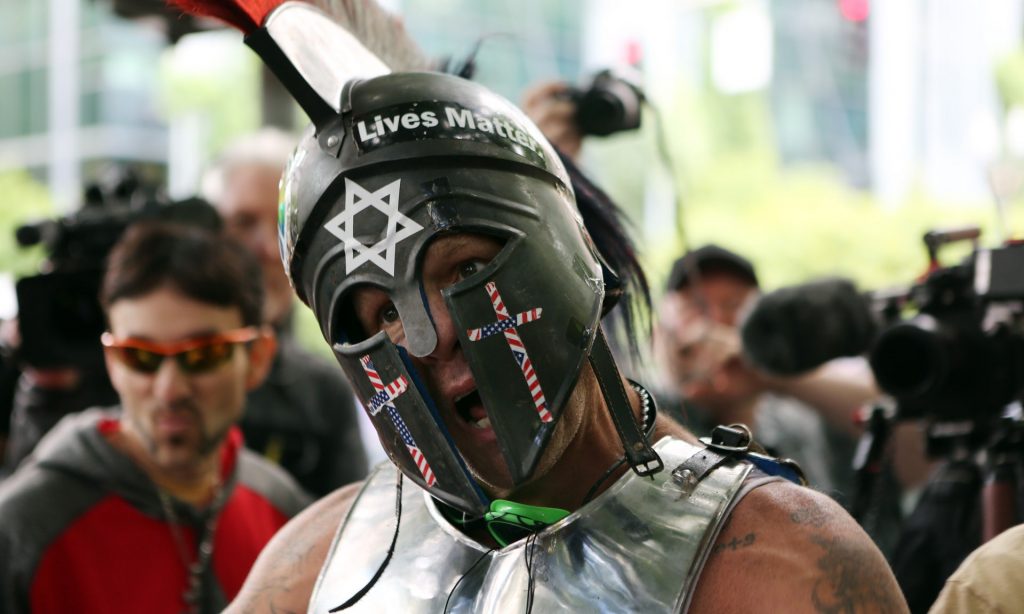Why did this powerful church group struggle to denounce white supremacy?
By Daniel José Camacho, Saturday 17 June 2017
Condemning white supremacy and the alt-right movement shouldn’t be hard. But the Southern Baptist Convention – the nation’s largest Protestant denomination– had its doubts about whether to do so this week.
During the annual meeting, they initially declined to pass a resolution doing just that. Chaos ensued at the denomination’s annual meeting and a firestorm of criticism quickly followed. Delegates eventually passed a modified version of the resolution – originally drafted by one of its black pastors – but the damage had been done.
It would be a mistake to interpret this fiasco simply as a misstep. The Southern Baptist Convention’s reluctance to condemn racism is not only true to its history but it reflects how white supremacy is built into the very DNA of American Christianity.
Some are shocked by the strong Christian support that Donald Trump has received. The brown refugee portrayed in the Gospels, who preached against the evils of hoarding wealth, is a far cry from the agenda of the megalomaniac executive foreshadowed in The Art of the Deal.
Trump’s policies and personal character seems beyond the pale even by the Religious Right’s standards. Yet, 80% of white evangelicals, a bloc with considerable representation in the Southern Baptist denomination, voted for Trump. Months into Trump’s first term, 78% of white evangelicals still approved of his presidency.
What if Christian support for Trump is not a contradiction of faith but the reproduction and fruition of Christianity’s modern legacy? After all, Christianity came into the Americas enslaving black people, dispossessing indigenous people of their lands, and committing sexual violence. In doctrine and practice, it justified all of this. Christian faith consolidated itself around the bodies of white, propertied men while dehumanizing others. Trump’s platform might not be a grotesque distortion of American Christianity as much as it is its sins come home to roost.
This is not to say that there haven’t been movements for justice and progress inspired by Christian faith. Even today, there is a smaller but significant progressive Christian circle resisting Trump. Nevertheless, historically, the scale has typically swung in the opposite direction. While distancing themselves from evangelicals, liberal (“mainline”) Protestant churches have had their own ethical struggles and remain some of the least racially diverse religious groups in the US.
It is important to remember that the recognition of non-white people as fully human is a novel development in modern American Christianity. Marginalized people who have taken up Christian faith and Jesus in the cause of their freedom have always run up against those who use faith and Jesus to justify the status quo.
In this light, the Southern Baptist reluctance to condemn white supremacy outright may be egregious but it is not illogical. This Convention came into existence over the defense of slavery.
To be sure, it has made some strides since its founding. For example, the denomination elected its first black president back in 2012. Russell Moore, president of the denomination’s Ethics and Religious Liberty Commission, has attempted to diversify the church and has been quite critical – by evangelical standards – of Trump. But Moore’s moderate views also led 100 Southern Baptist churches to threaten the denomination by pulling funds.
With every attempt Christians make to address America’s Original Sin of racism, there is an equal or greater opposite Christian backlash. I have personally witnessed this numerous times, the most recent being during my last semester of Divinity School.
As the New York Times reported, a professor at my school, Duke Divinity School, resigned in outrage over a voluntary anti-racism training being offered to faculty, students, and staff. Before the training even took place, he dismissed it as “totalitarian” and as a distraction from true theological studies.
Apparently, true theological studies must remain colorblind and oblivious to Christianity’s role in colonialism. For many Christians, whiteness has been and is the invisible norm which governs and shapes their congregations and their worldviews.
Black liberation theologian James Cone has written that the cross of Jesus Christ cannot be properly understood in America apart from the brutal realities of the lynching tree. If Christianity is to have any viable future, Christians must tackle its greatest moral contradictions. I think he is right.
At some point, it becomes naïve to see the white supremacy in American Christianity as an exception when it has been the rule. What is needed is more than reform and more than the correction of bad actions attached to otherwise innocent beliefs. Instead, the only alternative is a revolutionary Christianity that becomes something it has never been in the Americas; what is needed is the blossoming of a new kind of faith.
Photograph by Natalie Behring, Getty Images. https://www.theguardian.com/commentisfree/2017/jun/17/powerful-church-group-southern-baptist-struggle-denounce-white-supremacy#img-1

